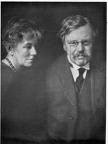O Dayspring! Brightness of eternal Light and Sun of Justice: come and enlighten them that sit in darkness and in the shadow of death.
~~~~~ " ~~~~~
This is the 5th of the 7 great "O" Antiphons of Advent that are sung at Vespers up until Christmas Eve.
These are beautiful prayers that tell of the coming of our God in the flesh using the words of the Old Testament that predict the coming of the Messias.
There are 7 of them. 7 is a sacred number - 7 days of the week, 7 Sacraments, 7 deadly sins and contrary virtues, 7 ages of man, 7 ranks of Holy Orders (Priest, Deacon, Subdeacon, Acolyte, Lector, Exorcist and Porter), 7 ranks of the Christian nobility, 7 diurnal hours of the Divine Office (Lauds, Prime, Terce, Sext, None, Vespers and Compline - Matins being the Night Office) and so on. 7 is the Biblical number of perfection whereas 6 is the number of sin.
The 7 "O" Antiphons are a most wonderful and ancient way to usher the Christian people into the Holy Presence that comes to us in the depth of the night on Christmas Eve as a tiny babe.
Who but God could think of such a marvellous way to come down from on high to visit His people.
Anton Raphael Mengs. The Adoration of the Shepherds.
NOLITE timere: quinta enim die veniet ad vos Dominus noster!
FEAR not: on the fifth day our Lord shall come to you!
[Antiphon of 21 December, 5 days before Christmas]
~~~~~ " ~~~~~
HAPPY CHRISTMAS
to all readers
O most Holy Night, all the earth being at peace...
"And Joseph also went up from Galilee out of the city of Nazareth, into Judaea to the city of David, which is called Bethlehem, because he was of the house and family of David, to be enrolled with Mary, his espoused wife, who was with child. And it came to pass, that when they were there, her days were accomplished that she should be delivered. And she brought forth her firstborn Son and wrapped Him in swaddling clothes, and laid Him in a manger, because there was no room in the Inn. And there were in the same country shepherds watching and keeping the night watches over their flock. And behold an Angel of the Lord stood by them and the brightness of God shone round about them, and they feared with a great fear. And the Angel said to them 'Fear not; for behold I bring you tidings of great joy that shall be to all people. For this day is born to you a Saviour who is Christ the Lord, in the city of David. And this shall be a sign unto you: you shall find the Infant wrapped in swaddling clothes and laid in a manger'. And suddenly there was with the Angel a multitude of the heavenly host, praising God and saying 'Glory to God in the highest and on earth peace to men of good will.' "
Sebastiano Conca. Adoration of the Shepherds. 1720.
O Adonai,
et Dux domus Israel, qui Moysi in igne flammae rubi apparuisti,
et ei in Sina legem dedisti: veni ad redimendum nos in brachio extento.
O Prince and Commander of the House of Israel, who appeared to Moses in the fire of the burning bush and gave him the law on Sinai: Come and redeem us with an outstretched arm.
et Dux domus Israel, qui Moysi in igne flammae rubi apparuisti,
et ei in Sina legem dedisti: veni ad redimendum nos in brachio extento.
O Prince and Commander of the House of Israel, who appeared to Moses in the fire of the burning bush and gave him the law on Sinai: Come and redeem us with an outstretched arm.
[Great O Antiphon for 18 December, sung before the Magnificat at Vespers]
Non auferetur sceptrum de Iuda, et dux de femore eius, donec veniat qui mittendus est: et ipse erit expectatio gentium
The royal sceptre shall not be taken away from Juda, nor a ruling prince from his loins, until He come that is to be sent, and He shall be the expectation of the nations.
The royal sceptre shall not be taken away from Juda, nor a ruling prince from his loins, until He come that is to be sent, and He shall be the expectation of the nations.
[Genesis 49:10, sung at Vespers of the Advent Office]
"And Joseph also went up from Galilee out of the city of Nazareth, into Judaea to the city of David, which is called Bethlehem, because he was of the house and family of David, to be enrolled with Mary, his espoused wife, who was with child. And it came to pass, that when they were there, her days were accomplished that she should be delivered. And she brought forth her firstborn Son and wrapped Him in swaddling clothes, and laid Him in a manger, because there was no room in the Inn. And there were in the same country shepherds watching and keeping the night watches over their flock. And behold an Angel of the Lord stood by them and the brightness of God shone round about them, and they feared with a great fear. And the Angel said to them 'Fear not; for behold I bring you tidings of great joy that shall be to all people. For this day is born to you a Saviour who is Christ the Lord, in the city of David. And this shall be a sign unto you: you shall find the Infant wrapped in swaddling clothes and laid in a manger'. And suddenly there was with the Angel a multitude of the heavenly host, praising God and saying 'Glory to God in the highest and on earth peace to men of good will.' "
[Luke 2:4-14]
[The Gospel of the Nativity of Our Lord, the first Mass of Christmas at midnight]
[The Gospel of the Nativity of Our Lord, the first Mass of Christmas at midnight]
OCTAVO KALENDAS JANUARII
The Eighth Day before the Calends of January, being
CHRISTMAS DAY
In the 5199th year of the creation of the world, from the time when God in the beginning created the heavens and the earth;
the 2957th year after the flood;
the 2015th year from the birth of Abraham;
the 1510th year from Moses, and the giving forth of the people of Israel from Egypt;
the 1032nd year from the anointing of King David;
in the 65th week according to the prophesy of Daniel;
in the 194th Olympiad;
the 752nd year from the foundation of the City of Rome;
the 42nd year of the rule of Octavian Augustus,
all the earth being at peace,
JESUS CHRIST
the eternal God,
and Son of the eternal Father,
desirous to sanctify the world by His most merciful coming,
being conceived by the Holy Spirit,
nine months after His conception
was born in Bethlehem of Judaea,
MADE MAN OF THE VIRGIN MARY.
THE NATIVITY OF OUR LORD JESUS CHRIST ACCORDING TO THE FLESH.
The Eighth Day before the Calends of January, being
CHRISTMAS DAY
In the 5199th year of the creation of the world, from the time when God in the beginning created the heavens and the earth;
the 2957th year after the flood;
the 2015th year from the birth of Abraham;
the 1510th year from Moses, and the giving forth of the people of Israel from Egypt;
the 1032nd year from the anointing of King David;
in the 65th week according to the prophesy of Daniel;
in the 194th Olympiad;
the 752nd year from the foundation of the City of Rome;
the 42nd year of the rule of Octavian Augustus,
all the earth being at peace,
JESUS CHRIST
the eternal God,
and Son of the eternal Father,
desirous to sanctify the world by His most merciful coming,
being conceived by the Holy Spirit,
nine months after His conception
was born in Bethlehem of Judaea,
MADE MAN OF THE VIRGIN MARY.
THE NATIVITY OF OUR LORD JESUS CHRIST ACCORDING TO THE FLESH.
[Sung at Prime on Christmas Day from the Roman Martyrology]
...

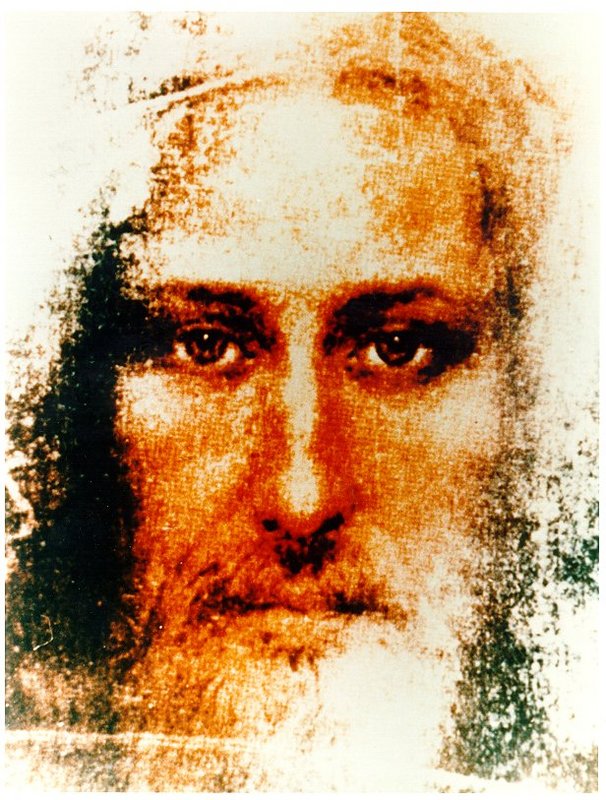



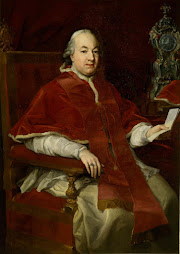

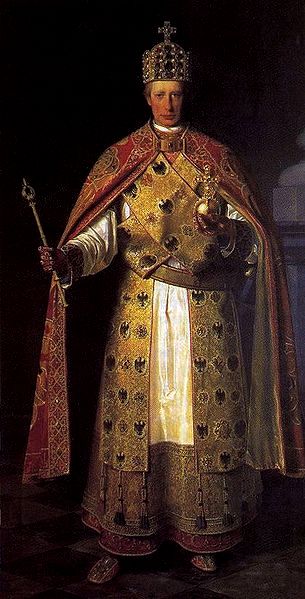




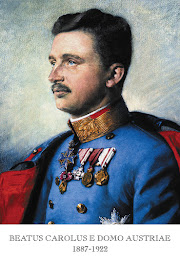

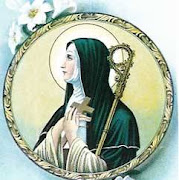


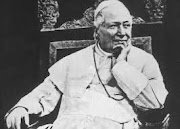
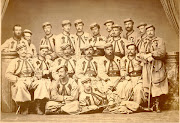
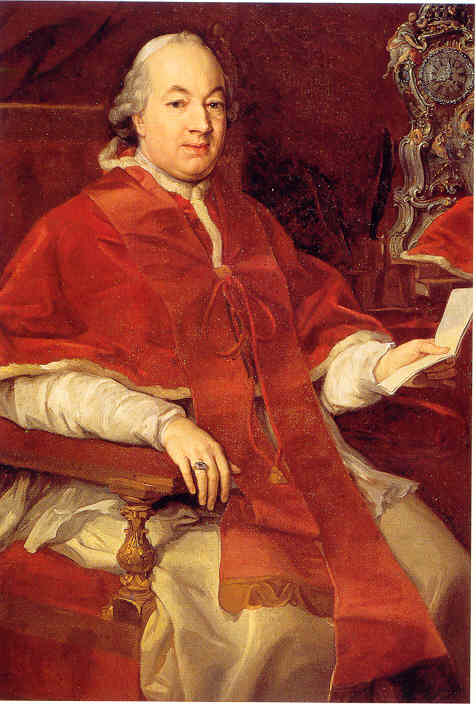
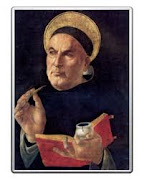



_-002.jpg/220px-Circle_of_Anton_Raphael_Mengs,_Henry_Benedict_Maria_Clement_Stuart,_Cardinal_York_(ca_1750)_-002.jpg)
